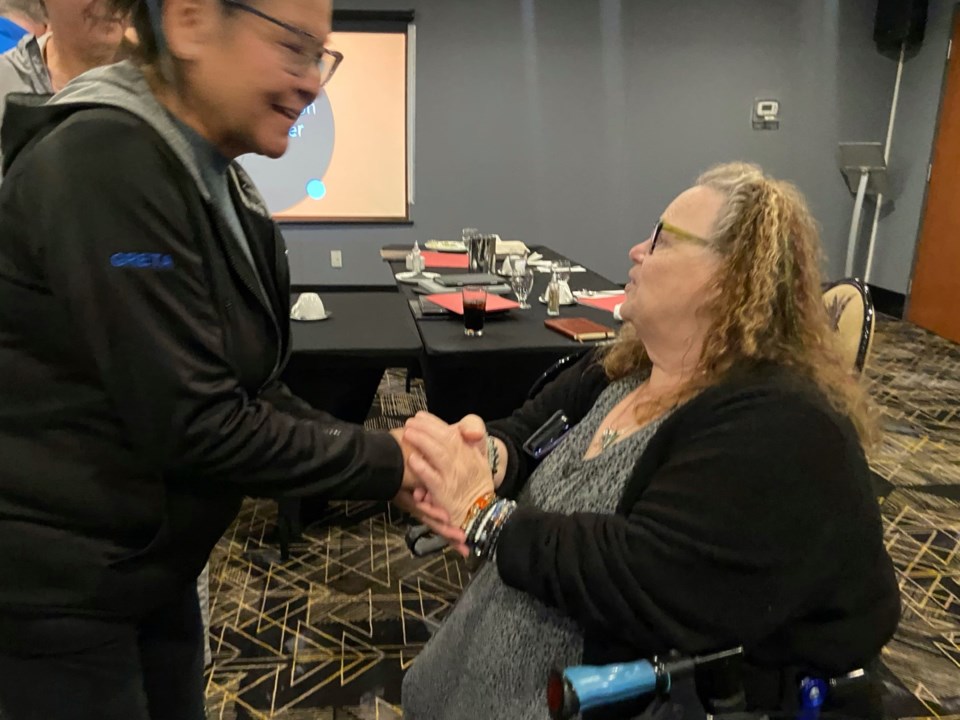NORTH BATTLEFORD — The $7,500 raised from Battlefords Regional Community Coalition (BRCC)’s first golf tournament in August went to North Battleford’s emergency shelter — the Miwasin Kikinaw (‘our home is good’) Shelter at 962 -102nd Ave., marking its 10th year in operation.
“We are grateful to see the community support and receive this donation from the BRCC,” said Operational Manager Pearl Little.
In the past three years since Battlefords Agency Tribal Chiefs (BATC) has taken over management, the shelter has received support from the Métis Nation of Saskatchewan, the City of North Battleford and the Province.
Little said the shelter currently receives an average of 15 people every day, but the number is going up as the days get colder.
Before the shelter representatives entered the room to receive the cheque, BRCC members were discussing heatedly with Bonnie Evans, a former senior strategist who retired from the BRCC table two years ago.
As a Métis person with white skin — what Evans referred to as being 'white privileged' — she shared her personal connection with the coalition, recalling the first time regional mayors sat with First Nation chiefs and leaders at the same table in 2018.
“We're a very racist community, and that's not acknowledged.
“I've been an advocate for Aboriginal rights for over 40 years. This is my passion. This is what I do. And putting this table together in 2018 was really a response to the outcome after the Gerald Stanley trial,” she explained.
Evans said the BRCC is important to her.
“We don't do very good at acknowledging not just the sins of the past, the sins of today as well. Because they continue,” Evans said. “And I'm hoping, through the coalition and the work that these leaders do in the region, will continue to move towards change.”
Both the city and town mayors were present at the cheque presentation at the Gold Eagle Casino meeting room, as it’s likely their last quarterly meeting of the year as a group.
“This was something that we really knew was a priority in the community, because we have a lot of people that have food insecurity, housing insecurity and, unfortunately, need the service of emergency shelter, and we're lucky we have it,” City Mayor David Gillan said.
“Places like the food bank and the shelter are in place to hopefully help those people stay on their feet until they can land back into a positive place in their lives. I know myself as the mayor and the council of the Town of Battleford, [we are] grateful that we have the shelter in place for those people to turn in these times where the economy is not there to,” Mayor Ames Leslie added.
Little said the funds mean “everything” to her job at the shelter: “It doesn’t even feel like a job. I [just] come there and be me and do what I have to do.”
“We've heard people say that ‘when they come and stay there, they feel safe.’ They come here because they feel safe, and out there, we provide nothing else,” added shelter cook Rachel Tuffs.
Evans said she is hopeful of the coalition as she passed on her work to Brad Swiftwolfe, former Moosomin First Nation chief and current executive director for the BRCC.
As stated in the Sacichawasihc Relationship Agreement signed in June 2019, the coalition survives government changes:
“Any changes in their governments, including changes to the offices of their respective Chiefs and Councils, shall not impact this Agreement which shall continue to survive government changes by reason of the political processes of each party.”
“And it's more than just diversity. It's about acknowledgement of the injustices and the indignant behaviour that our Aboriginal Peoples still receive in this region,” Evans concluded.
The BRCC’s current anti-racism project will offer free training workshops for local organizations and create a framework to incorporate anti-racism principles into their policies, following the United Nations Declaration on the Rights of Indigenous Peoples.




